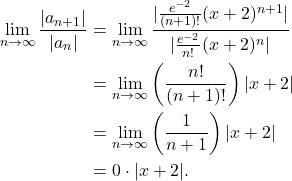Problem 250: The power series of ![]() around
around ![]() is given by
is given by
(1) ![]()
Find the radius of convergence.
Solution: One can use the ratio test to find the radius of convergence. That is, we an ![]() value such that
value such that
(2) ![]()
for all ![]() . Thus
. Thus
(3) 
That is, we want
(4) ![]()
which is true for all ![]() values. Therefore, the radius of convergence is
values. Therefore, the radius of convergence is ![]() or
or ![]() .
.

Leave a Reply